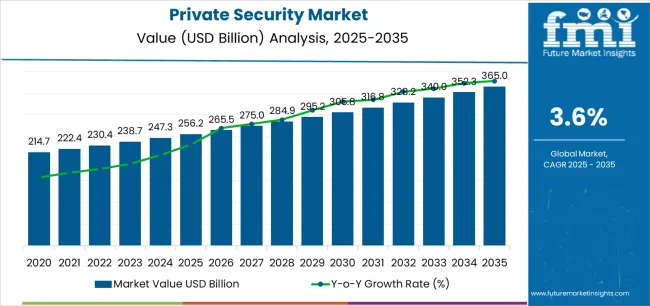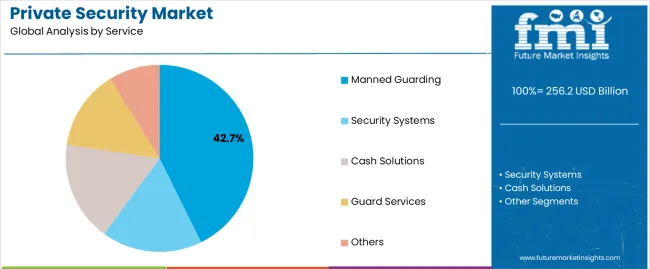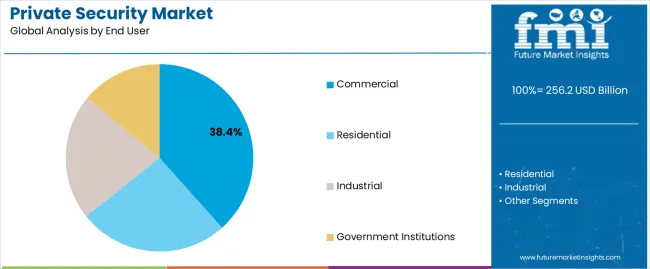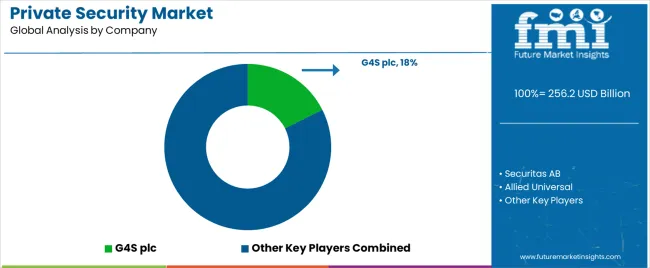The private security market is experiencing steady expansion driven by increasing concerns over property protection, rising crime rates, and the growing need for safety management across commercial and residential sectors. Demand is being reinforced by rapid urbanization, infrastructure development, and the expansion of high-value facilities requiring professional security oversight. The industry is witnessing a transition toward integrated security solutions that combine manpower with technology, including surveillance systems and access control mechanisms.
Market growth is further supported by regulatory frameworks mandating safety compliance and workforce training. Companies are investing in workforce quality, digital platforms, and data-driven monitoring systems to enhance operational efficiency and client satisfaction.

| Metric | Value |
|---|---|
| Private Security Market Estimated Value in (2025 E) | USD 256.2 billion |
| Private Security Market Forecast Value in (2035 F) | USD 365.0 billion |
| Forecast CAGR (2025 to 2035) | 3.6% |
The future outlook remains positive as businesses continue to outsource non-core security functions to specialized service providers The combination of cost efficiency, reliability, and scalability in security services is expected to sustain long-term market growth and strengthen the overall competitive positioning of organized players within the sector.
The market is segmented by Service and End User and region. By Service, the market is divided into Manned Guarding, Security Systems, Cash Solutions, Guard Services, and Others. In terms of End User, the market is classified into Commercial, Residential, Industrial, and Government Institutions. Regionally, the market is classified into North America, Latin America, Western Europe, Eastern Europe, Balkan & Baltic Countries, Russia & Belarus, Central Asia, East Asia, South Asia & Pacific, and the Middle East & Africa.

The manned guarding segment, accounting for 42.7% of the service category, has maintained its dominance due to continued reliance on physical presence for deterrence, surveillance, and emergency response functions. Its growth has been supported by sustained demand from corporate, industrial, and residential clients seeking personalized and responsive protection solutions.
The segment’s leadership is being reinforced by the integration of technology-enabled supervision and remote monitoring systems that enhance efficiency and reduce operational risks. Increasing professionalization of security personnel through structured training programs and adherence to compliance standards has further strengthened client confidence.
In emerging markets, expansion of commercial spaces and critical infrastructure projects is driving higher demand for skilled guards Continuous investment in workforce development and strategic outsourcing by businesses are expected to sustain the segment’s strong position and ensure consistent revenue contribution to the overall private security market.

The commercial segment, representing 38.4% of the end user category, has been leading the market due to the expanding number of offices, retail centers, and industrial facilities requiring security coverage. Demand is being supported by the growing complexity of commercial operations, heightened asset protection needs, and compliance requirements across sectors such as finance, logistics, and hospitality.
The segment benefits from the rising trend of long-term service contracts and integrated security management solutions that combine surveillance, access control, and on-site personnel. Technological adoption, including AI-enabled monitoring and predictive analytics, is enhancing service reliability and cost efficiency.
The sustained expansion of commercial real estate and the emphasis on risk prevention are expected to reinforce the segment’s leadership Continuous investment in tailored security strategies and partnership-based service models will likely support further market penetration and long-term growth stability within the private security industry.
Development of Autonomous Security Vehicles and Robotics Gains Traction in the Market
With technological innovations rising unprecedentedly, developing autonomous security vehicles and robotics is a strategic breakthrough in the private security services industry. This requires cutting-edge technologies for surveillance, patrolling, and response operations.
By employing autonomous security vehicles and robotics, private security businesses can optimize resource allocation and provide clients with advanced privacy security solutions that align with the evolving automation trends. This approach positions security organizations as trailblazers in embracing cutting-edge technology to improve operational performance.
Recognizing this potential, in December 2025, Kodiak Robotics, Inc., an innovative self-driving technology developer for the transportation and defense industries, launched its first autonomous test vehicle created particularly for the United States Department of Defense (DoD).
This vehicle is a Ford F-150 equipped with Kodiak's autonomous technology, the Kodiak Driver, which includes both the autonomy hardware and software needed to run a military ground vehicle.
Cloud-based Security Platform Adoption Rises in the Market
Private security companies are increasingly adopting cloud-based security platforms, recognizing their scalability, flexibility, and accessibility. Cloud-based private security platforms are cost-effective and enhance overall operational efficiency.
In an increasingly digital and connected world, staying updated with technological changes is critical. The strategic use of cloud-based personal security platforms ensures that security solutions stay flexible, adaptable, and well-suited to the changing demands of organizations.
Demand for Behavioral Analytics for Threat Detection Surges in the Market
Private security firms are incorporating behavioral analytics into their threat detection processes. This process searches for abnormalities that indicate possible security risks in both digital and physical environments.
Security companies are likely to establish themselves as pioneers in anticipatory security solutions by taking a proactive stance and utilizing human behavioral patterns to identify and address risks. Security companies can be recognized as providers of advanced threat detection tools based on behavioral analytics and gain prominence in the private security industry.
| Segment | Guard Service (Service) |
|---|---|
| Value Share (2025) | 33.60% |
Based on services, the guard service segment holds 33.60% of private security market shares in 2025.
Guard services in private security occasionally perform multiple duties, integrating security operations with client service along with access control responsibilities. Their presence helps to provide a sense of security for customers, staff, and visitors. Guards at access points can enforce entrance rules, verify identification, and assist, improving overall safety and enabling smooth operations.
Manned guarding in private security can be customized for a variety of situations and industries. Security guards can be placed in a variety of locations, including retail enterprises, factories, educational institutions, and residential areas. This versatility makes guard services a versatile and broadly applicable solution, leading to their continued demand in a variety of industries.
| Segment | Commercial Sector (End User) |
|---|---|
| Value Share (2025) | 49.20% |
Based on end user, the commercial sector captured 49.20% of private security market shares in 2025.
The commercial sector encounters a variety of security concerns, such as theft, burglary, and vandalism, that can interrupt operations and ruin reputations. Private security services inhibit criminal activity by keeping a visible presence, conducting patrols, and installing surveillance systems. Businesses defend their assets, ensure company continuity, and retain their market reputation by preventing possible threats.
The commercial sector emphasizes risk management to mitigate possible liabilities and protect against financial losses. Private security organizations specialize in detecting security threats, executing preventative measures, and successfully responding to security crises. Businesses that outsource security services witness a decline in risks, save insurance costs, and demonstrate due diligence in meeting their duty of care.
| Countries | Value CAGR (2025 to 2035) |
|---|---|
| United States | 1.90% |
| Germany | 0.70% |
| Japan | 4.30% |
| China | 3.30% |
| India | 6.80% |
The demand for private security in the United States is expected to rise at a 1.90% CAGR through 2035.
The rising prevalence of remote work is causing new safety issues. Private security organizations are grabbing this opportunity to offer customized solutions for safeguarding remote work settings.
This involves setting up secure communication channels, providing virtual private network (VPN) solutions, and performing remote cybersecurity training. As organizations handle the complications of a dispersed workforce, private security services focusing on remote work security are growing more popular.
Private security businesses are at the forefront of using innovative drone surveillance technology to improve their capabilities. Drones outfitted with advanced cameras and sensors offer an aerial view for full security surveillance.
By incorporating drone technology into their services, security businesses provide clients with improved situational awareness, fast reaction capabilities, and cost-effective surveillance solutions, meeting increasing security demands across several sectors.
Private security market growth in Germany is estimated at a 0.7% CAGR through 2035.
Recent legal developments, such as the introduction of the General Data Protection Regulation (GDPR) and stricter security requirements, are driving demand for private security services in Germany. Businesses face increasing pressure to comply with severe data protection laws and security requirements, which is driving the demand for specialized security solutions.
Private security organizations are profiting from these regulatory obligations by providing customized solutions that help businesses achieve compliance, reduce legal risks, and protect sensitive information.
Considering Germany's strong emphasis on renewable energy, private security organizations are expanding their services to secure critical assets in the renewable energy sector. Solar farms, wind turbines, and other green energy assets are vulnerable to theft, vandalism, and cyber attacks.
Security businesses specialized in protecting renewable energy infrastructure provide personalized solutions that contribute to the country's sustainable development goals while protecting important energy assets.
The demand for private security in Japan is estimated to surge at a 4.30% CAGR through 2035.
In Japan's private security industry, the incorporation of artificial intelligence (AI) and robotics is an emerging trend. Security companies are using robotics for monitoring, AI-powered analytics for danger identification, and automation for regular security duties. This technology integration helps create more sophisticated and effective security operations while harmonizing with Japan's innovative environment.
The demand for security services specifically catered to manufacturing facilities is increasing due to Japan's manufacturing resilience, especially in the high-tech industries. Private security companies offer specialized security solutions to safeguard supply chains, guard manufacturing operations, and stop illicit trade.
This distinctive element helps to safeguard priceless assets and trade secrets by meeting the particular security requirements of Japan's sophisticated manufacturing industry.
Private security market growth in China is estimated at a 3.30% CAGR through 2035.
China's successes in the field of drone technology LED to advances in the deployment of drones for surveillance, patrolling, and reconnaissance in private security services. Security corporations use drones with cameras and sensors to monitor wide regions, conduct aerial surveillance, and swiftly respond to security problems.
This rare aspect highlights China's security industry's embrace of new technology, which improves private security businesses' ability to meet evolving security concerns.
China's massive infrastructure construction projects, such as high-speed rail networks, power plants, and smart grid systems, need extensive security measures to prevent potential breaches and disruptions.
Private security companies specialize in providing security services for vital infrastructure projects, such as risk assessments, perimeter defense, and emergency response plans. Security businesses safeguard important infrastructure projects and help China's essential national programs succeed and operate smoothly.
The demand for private security in India is anticipated to surge at a 6.80% CAGR through 2035.
India's growing emphasis on home security leads to an additional demand for private security services in gated communities, apartment buildings, and single-family homes. Access control, monitoring, and community patrols are just a few options private security companies provide. This aspect is indicative of the evolving demands for home security in India, where private security plays a role in fostering safe living conditions.
The specific demand for private security services designed to handle gender-specific security difficulties stems from greater awareness and growing concerns for women's safety in India.
Private security companies provide solutions such as women's safety services, secure transportation services, and expert security personnel trained to handle crises involving women. This aspect emphasizes the importance of private security in contributing to society's safety and meeting unique security demands in the context of gender.

The private security market is highly competitive. Key players in the market include Securitas AB, G4S plc, and Allied Universal. These businesses benefit from their global presence and diversified service offerings. Regional players like Prosegur and GardaWorld use specialized services to tap into niche markets.
Technological innovation, regulatory compliance, and customer-centric strategies are critical competitive elements, with businesses relying on sophisticated technology, industry certifications, and specialized solutions to differentiate and prosper in a competitive market.
Recent Developments
The global private security market is estimated to be valued at USD 256.2 billion in 2025.
The market size for the private security market is projected to reach USD 365.0 billion by 2035.
The private security market is expected to grow at a 3.6% CAGR between 2025 and 2035.
The key product types in private security market are manned guarding, security systems, cash solutions, guard services and others.
In terms of end user, commercial segment to command 38.4% share in the private security market in 2025.






Our Research Products

The "Full Research Suite" delivers actionable market intel, deep dives on markets or technologies, so clients act faster, cut risk, and unlock growth.

The Leaderboard benchmarks and ranks top vendors, classifying them as Established Leaders, Leading Challengers, or Disruptors & Challengers.

Locates where complements amplify value and substitutes erode it, forecasting net impact by horizon

We deliver granular, decision-grade intel: market sizing, 5-year forecasts, pricing, adoption, usage, revenue, and operational KPIs—plus competitor tracking, regulation, and value chains—across 60 countries broadly.

Spot the shifts before they hit your P&L. We track inflection points, adoption curves, pricing moves, and ecosystem plays to show where demand is heading, why it is changing, and what to do next across high-growth markets and disruptive tech

Real-time reads of user behavior. We track shifting priorities, perceptions of today’s and next-gen services, and provider experience, then pace how fast tech moves from trial to adoption, blending buyer, consumer, and channel inputs with social signals (#WhySwitch, #UX).

Partner with our analyst team to build a custom report designed around your business priorities. From analysing market trends to assessing competitors or crafting bespoke datasets, we tailor insights to your needs.
Supplier Intelligence
Discovery & Profiling
Capacity & Footprint
Performance & Risk
Compliance & Governance
Commercial Readiness
Who Supplies Whom
Scorecards & Shortlists
Playbooks & Docs
Category Intelligence
Definition & Scope
Demand & Use Cases
Cost Drivers
Market Structure
Supply Chain Map
Trade & Policy
Operating Norms
Deliverables
Buyer Intelligence
Account Basics
Spend & Scope
Procurement Model
Vendor Requirements
Terms & Policies
Entry Strategy
Pain Points & Triggers
Outputs
Pricing Analysis
Benchmarks
Trends
Should-Cost
Indexation
Landed Cost
Commercial Terms
Deliverables
Brand Analysis
Positioning & Value Prop
Share & Presence
Customer Evidence
Go-to-Market
Digital & Reputation
Compliance & Trust
KPIs & Gaps
Outputs
Full Research Suite comprises of:
Market outlook & trends analysis
Interviews & case studies
Strategic recommendations
Vendor profiles & capabilities analysis
5-year forecasts
8 regions and 60+ country-level data splits
Market segment data splits
12 months of continuous data updates
DELIVERED AS:
PDF EXCEL ONLINE
Private Wealth Management Service Market Size and Share Forecast Outlook 2025 to 2035
Security Tape Market Size and Share Forecast Outlook 2025 to 2035
Security Alarm Communicator Market Size and Share Forecast Outlook 2025 to 2035
Security and Vulnerability Management Market Forecast and Outlook 2025 to 2035
Private Tutoring Market Forecast and Outlook 2025 to 2035
Private Label Pet Food Market Size and Share Forecast Outlook 2025 to 2035
Security Holograms Market Size and Share Forecast Outlook 2025 to 2035
Security Paper Market Size and Share Forecast Outlook 2025 to 2035
Security System Tester Market Size and Share Forecast Outlook 2025 to 2035
Security Advisory Services Market Size and Share Forecast Outlook 2025 to 2035
Security Room Control Market Size and Share Forecast Outlook 2025 to 2035
Private Electric Vehicle Charging Station Market Size and Share Forecast Outlook 2025 to 2035
Security Cameras (IR Illuminator) Market Size and Share Forecast Outlook 2025 to 2035
Security Operation Centre as a Service Market Size and Share Forecast Outlook 2025 to 2035
Security Robots Market Size and Share Forecast Outlook 2025 to 2035
Security Service Edge Market Size and Share Forecast Outlook 2025 to 2035
Security and Surveillance Equipment Market Size and Share Forecast Outlook 2025 to 2035
Security Orchestration Automation and Response (SOAR) Market Size and Share Forecast Outlook 2025 to 2035
Security Bags Market Size and Share Forecast Outlook 2025 to 2035
Security Screening Market Analysis - Size, Share, and Forecast 2025 to 2035

Thank you!
You will receive an email from our Business Development Manager. Please be sure to check your SPAM/JUNK folder too.
Chat With
MaRIA